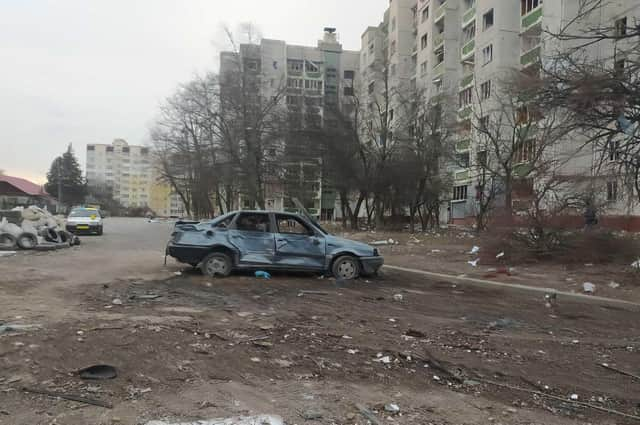Harborough District Council steps up efforts to support Ukrainian people


Harborough District Council is stepping up efforts to support Ukrainian people fleeing their war-shattered homeland.
The local authority has put up a special new webpage to highlight how people across Harborough can do their bit to help devastated refugees after Russian armed forces invaded Ukraine a fortnight ago.
Advertisement
Hide AdAdvertisement
Hide Ad“The government has produced information on how people can support those who have been forced to flee their homes because of the conflict in Ukraine.
“If individuals wish to donate money, there are a number of charities providing humanitarian relief in Ukraine,” says the council.
“There are many organisations across the UK and internationally which have launched appeals - and people may wish to donate through these organisations instead.”
The council says there are some simple steps to make to ensure donations are safe and being used effectively:
Advertisement
Hide AdAdvertisement
Hide AdCheck the charity’s name and registration number at www.gov.uk/checkcharityMost charities with an income of £5,000 or more must be registered, which means they are regulated by The Charity Commission
Make sure the charity is genuine before giving any financial information
If in doubt, ask the charity or organisation for more information.
By giving to a registered, regulated charity, like the Disasters Emergency Committee, the public can have assurance that their funds will be accounted for in line with the charity law framework. “Established charities with experience of responding to disasters are usually best placed to ensure that people receive the help they need.
Advertisement
Hide AdAdvertisement
Hide Ad“One of the best ways to help is by donating cash through trusted charities and aid organisations, rather than donating goods,” says the authority.
“Cash can be transferred quickly to areas where it is needed and individuals and aid organisations can use it to buy what is most needed.
“Unsolicited donations of goods, although well-meant, can obstruct supply chains and delay more urgent life-saving assistance from getting through.
“Organisations across the UK are gathering essential supplies, such as clothes, first aid and sanitary products.
Advertisement
Hide AdAdvertisement
Hide Ad“Many charities and community groups will have lists of items they need.
“Charities with experience of responding to disasters are best placed to reach the people who need help,” says the council.
“The government will also be launching a new sponsorship scheme to make sure that Ukrainians who have been forced to flee their homes have a route to safety.
“The scheme will match people, charities, businesses and community groups to Ukrainians who do not have family ties to the UK.
Advertisement
Hide AdAdvertisement
Hide Ad“Details of the scheme and how to apply will be published shortly by the Department for Levelling Up, Housing and Communities.
“People’s situations are very complicated.
“Be aware that in order for refugees to achieve secure futures for themselves or their family, they should only accept advice from an adviser accredited by the OISC (Office of the Immigration Services Commissioner).
“If you see people asking for help online then please direct them to the OISC website.”
For information and advice on travel to and from Ukraine visit www.gov.ukThe British Government, Ukrainian Government and others have been sharing messages of support on social media using the hashtags #StandForUkraine and #StandWithUkraine.
“Take care what you share!
Advertisement
Hide AdAdvertisement
Hide Ad“There is a lot of false information about the conflict circulating online - this is often called misinformation and disinformation,” says the council.”
You can do your part to stop the spread:
Ask yourself – does this look right? Does this sound right? Does this information come from a source I recognise?
The SHARE checklist can help you decide if information can be trusted, before you interact with or share it on your social media channels.
You can check out the council’s new Ukraine webpage here: https://www.harborough.gov.uk/support-ukraineAnd you can find out more on the Government’s Ukraine webpage here: https://www.gov.uk/government/news/ukraine-what-you-can-do-to-help